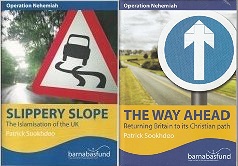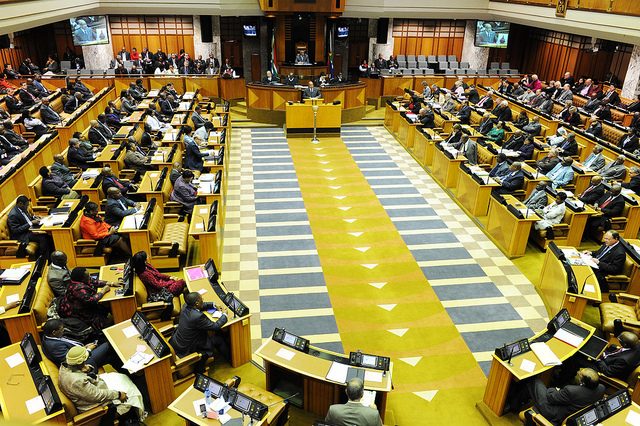Peter Fenwick continues to assess the roots of the Toronto Blessing.
(This article is part of a series. Click here for previous instalments)
Restorationism: The Promise of Triumph
In the 1970s most of the ‘new churches’, as the house churches are now called, were swept by Restorationist teaching, which created great expectations of triumph for the Church of God. It was embraced as a very welcome antidote to the widespread and gloomy views of the Church's future which had been disseminated by Dispensationalist teaching.
According to that Dispensationalist view, the Church on earth could look forward only to deterioration leading to failure and ignominy. As is so often the case, one extreme position was rejected, only for another to be embraced.
Restorationism came presenting an absolutely opposite view of the Church, and taught that the Church would, in this age and before the return of Jesus, become overwhelmingly successful in every area of human life. In particular, this meant that the Church would overwhelm the secular world - not by military means, but by the force of righteousness.
The Church's influence would be so massive and extensive that it would dominate Government, education, business and finance, the judiciary, law enforcement, the arts etc. This did not mean that there would necessarily be a Christian political party in Parliament; that would not be necessary. The Church would be seen to be so glorious in wisdom and righteousness that Government and political leaders everywhere would come to it for counsel and advice.
Education planners and captains of industry as well as leaders in other fields of human activity would all in similar fashion be accepting the Church's standards and the Church's direction for their affairs. The righteous rule of Christ which is foretold following the return of Christ to the earth would be in very large measure realised before his return.
Restorationist teaching created great expectations of triumph for the Church.
Almost as a by-product, the Church and its members would become wealthy as a grateful world brought its riches and laid them at the Church's feet. Such beliefs clearly opened the door wide for the ‘health-and-wealth’ errors of the so-called 'Faith Movement'.
It was strongly felt that evangelism would probably not be needed. It would be enough for non-Christians to see how good the 'new brand' of Christianity was as relationships were put right, and as Christians loved and served each other and bore each other's burdens. They would voluntarily press into the Church in great numbers and thus be readily converted. Persecution was not really expected, failure was out of the question, and trials and tribulations were not on anyone's agenda.
Interpretation of Scripture
It must be said that the errors of Restorationism, and errors they are, did not result from the Bible being by-passed as I described last week concerning other practices. On the contrary, extensive appeal was made to the Bible. It is not within the scope of this chapter to thoroughly examine what went wrong. But the nub of the error was as follows.
Jesus and the Apostles, as recorded in the New Testament, took many statements and incidents from the Old Testament and applied them to the Church, thus usually giving them a wider meaning. These statements and incidents originally concerned either certain individuals or the whole Jewish people. Restorationist teaching followed that pattern and applied it to other Old Testament passages relating to promises given to Israel, transferring them to the Church.
I submit to the reader that this approach is not legitimate. Jesus was the divine Son of God and knew all things. He therefore had an absolute right to say which Old Testament passages apply to the Church and which do not. Furthermore, Jesus promised the Spirit of Truth for all believers (John 14:15) which enables us to discern those passages of the Old Testament that were for Israel and those that can be applied to the Church.
Great Expectations
Without doubt, Restorationism was an ultimate statement of over-realised eschatology. What is more, its expectations were to happen soon. When this was being declared in the 1970s and the early 1980s, no-one seriously believed that the year 2000 might arrive without much of this victory already well in place.
The expectations amongst the people of God were quite enormous and they would return in their thousands from the great Bible weeks fully expecting to see progress within the following months.
Naturally the churches themselves expected to see a power and beauty which far exceeded anything that had been experienced in the previous 2,000 years of Church history. Attempts were made to show that throughout the years, certainly since the Reformation, the Church had become, by successive stages, more powerful and more beautiful, and now the ultimate was about to be achieved.
Restorationism was the ultimate statement of over-realised eschatology.
It must be said that there was a great deal of human pride in all of this. It was believed that it would be the charismatic churches which would achieve this, and in particular, the Restorationist charismatic churches. They would pave the way for the other churches to participate, provided of course those other churches embraced Restorationist principles. If they did not, they would be completely by-passed by God himself as he fulfilled his purposes in the earth.
None of this has happened. None of these massive expectations have been fulfilled and many of the people who were in receipt of those promises had reached a point of disappointment and considerable disillusion.
The truth is that the very opposite has happened. In all of those fields that I have previously mentioned where the Church was expected to exercise such a powerful influence, the decline of decades has not even been arrested; moral deterioration continues and the Church which was to have been such a strong influence for good frequently finds itself an object of scorn and ridicule. It has become more than ever marginalised and tends to be thoroughly ignored by Government, industry and society in general.
Restorationism was never openly repudiated, but quietly slipped out of prominence. However, the hunger amongst the people of God for something very spectacular to happen had been born and continues to this day. The great cry was then 'God is doing a new thing' and the momentum has been kept going by new phases with the cry being repeated each time. However, there has still not been any delivery of the expectations.
Hunger for Breakthrough
John Wimber, in 1983, began a process that was to greatly widen this sense of expectation beyond the Restorationist movement. He successfully appealed to the mainline churches, even though he himself was not a 'mainline' man. He taught that signs and wonders allied to evangelism (‘power evangelism’) would lead to great progress in the conversion of the United Kingdom. It did not happen.
Strange things undoubtedly did happen in Wimber meetings and particularly during the ministry times as people screamed, fell about and trembled. The momentum was thus maintained. It was felt that something was happening and that it was all going to lead to a great breakthrough for the Kingdom of God.
The hunger amongst God’s people for something very spectacular to happen continues to this day.
When in 1990 the Kansas City prophets were introduced into the United Kingdom the whole matter of expectations stepped up a gear. It was prophesied that there was going to be a revival later that year which would surpass the revival which had taken place in this nation in the 18th Century under the Wesleys. Yet again nothing happened, the expectations were not fulfilled and the question undoubtedly arose: how much more can even the most gullible people take of this sort of thing?
By this time, undoubtedly, anxiety was at large in charismatic circles. Thus, when the Toronto Blessing appeared, the need for something remarkable was so great that the questioning and testing procedures that should always be applied to such things were frankly superficial and sporadic at best.
Even though the Toronto Blessing was accompanied by manifestations never before seen in the whole history of the Church, including the New Testament record, because something remarkable undoubtedly was happening it has been taken on board in a most indiscriminate manner.
Decline in Bible Knowledge
Let me now turn to the second factor which made the charismatic Church vulnerable to departure from biblical truth and practice.
When the house churches first emerged, there was a lot of healthy radical thinking about Christian life and practice. The object of all of this was to endeavour to re-establish something which was perceived to have been lost, namely the simplicity and purity of the life of the early Church, as depicted in the New Testament.
Therefore, all church practices were subjected afresh to the scrutiny of God's word, and I believe that most objective critics would judge that a very great deal of good emerged from that. Even though leaders in the older denominations often saw house churches as a threat, some of them recognised how their own churches might benefit from the discoveries of these new churches.
The search was on for absolute honesty in all aspects of church life and for genuineness in the exercise of charismatic gifts. Anything that was even slightly false was questioned and as an example, house churches were dangerous places to be for anyone wishing to indulge in super-spirituality.
Unnecessary meetings were scrapped, along with cumbersome committees; silliness in charismatic things was given short shrift, and ridiculous prophecies were given no houseroom at all. There was the development of genuine fellowship and great generosity, and in the realm of demonology there was no dualism whatsoever; Christ was King over all.
The Toronto Blessing was taken on board in a most indiscriminate manner, because something remarkable undoubtedly was happening.
However, in a concerted attack on legalism, diligent application to the Bible itself also came under attack, and whether the message was intended or not, large numbers of Christians began a process of taking personal Bible study less and less seriously. At the same time, expository and doctrinal preaching came to be regarded as old hat, intellectualism, heavy and wearisome.
As a result, there has emerged a famine of the Word of God, and whilst I do not believe that this is confined to the charismatic churches it has nevertheless left large numbers of Christians without the capacity to judge for themselves from Scripture whether a thing is of God or not. They are defenceless against error, in the form of both doctrine and practice, taking hold of the Church of God.
Misuse of Scripture
It even becomes possible for leaders to seriously misquote the scriptures and the people believe that God is speaking. One video of the day showed Rodney Howard-Browne addressing an audience of thousands who cheered as he declared, “Don't try to understand this. Don't you know the natural mind cannot receive the things of the Spirit of God?”
This is taken from 1 Corinthians 2:14 and is almost a correct quotation. Paul actually says 'the natural man', not 'mind', and he is clearly referring to unregenerate man, non-Christian man. Paul goes on to talk about the Christian man, and asserts that this man has the mind of Christ (v16 of the same chapter). Such a man is, 'a spiritual man' and is required to judge all things (v15). What the Apostle Paul teaches is the complete opposite of what Browne is saying, and yet Christian people sit there cheering this appalling manipulation of the word of God.
Many people in the Toronto movement eventually took steps to put some distance between themselves and Rodney Howard-Browne, but many did not. This dictum of Browne's: that is, the by-passing of your mind and your critical faculties, has been carried far and wide into the Toronto Blessing churches and has become a fundamental factor in the whole 'receiving process' of this phenomenon.
I quote examples of what has been said in English churches.
“Don't let the Bible get in the way of the blessing.”
“Some of you Bible-lovers need to put it down and let God work on you.”
“The Bible has let us down. It has not delivered the numbers we need.”
“You must not let your mind hinder the receiving of the blessing.”
The result of all this is that when a new teaching or a new experience comes along, many Christians have no way of assessing whether or not it is of God. Even when the Holy Spirit with them is telling them 'This is very queer', they jump in just in case it is God at work they do not want to miss him.
There has emerged a famine of the Word of God, leaving large numbers of Christians defenceless against error.
If people act in this way, it is inevitable that they will end up in trouble sooner or later, and many well-meaning charismatics have been up one blind alley after another.
The dangers are compounded by the fact that too many preachers/leaders have few skills in expounding the scriptures and laying out the truth before the people. Some hardly speak from the scriptures at all, and of those who do, too many spend their time spiritualising and allegorising them.
Conclusion
The burden of what I am saying is this: within charismatic churches great expectations have been built up among the people of God; expectations that something spectacular, something extraordinary, something perhaps even sensational is going to happen.
Disappointment has followed disappointment, but no-one can possibly be satisfied with the simple life of patiently enduring hardship as good soldiers of Jesus Christ, nor faithfully persevering in the face of setbacks, disappointments and defections as the Apostles evidently had to; no, there must be something very big round the next corner.
But because we live in a day when personal knowledge of the Bible is at its lowest ebb for years, and the capacities for discernment and spiritual discrimination have been discarded, the people of God are left wide open to almost anything.
Am I asserting that absolutely nobody in any pro-Toronto church has received any blessing at all from God? No, because God is always eager to bless hungry children who are truly seeking his face and I am therefore in no doubt that there will be individuals who have been truly blessed of God.
However, from my own experience, I have to add that it is on nothing like the scale that people would have us believe. There have not been huge numbers of lives remarkably changed, nor have there been large numbers of conversions, nor have there been significant numbers of healings. I shall have more to say about this next week.
Next week: was the Toronto Blessing biblical – and does it matter?
Originally published 1995. Revised and updated December 2017.







